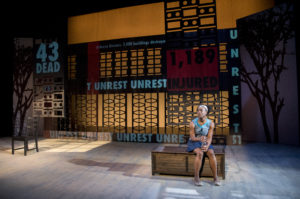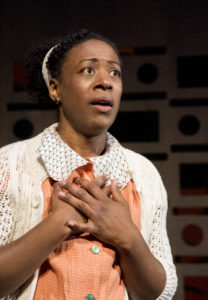It’s no coincidence that Queens Girl in Africa—Caleen Sinnette Jennings’ semi-autobiographical one-woman play now at Mosaic Theater Company of DC—was chosen to kick off the Women’s Voices Theater Festival earlier this week.
The original play, Queens Girl in the World, was the hit of the first Women’s Voices Theater Festival in 2015. Produced by Theater J, the show, starring Dawn Ursula as the 12-year-old Jacqueline Marie Butler, was described by my colleague, John Stoltenberg, as “a breathtaking dramatization of the meaning of race consciousness in America.”
Now at Mosaic, with Helen Hayes Award-winner Erika Rose in the title role, Queens Girl in Africa picks up precisely where the previous play ended.

Jackie, now 15, has been yanked out of her progressive—and mostly white—private high school in Greenwich Village and is on her way to Nigeria. It is, as she soon discovers, a place where the toilet is a hole in the ground and where servants carry machetes.
Why Nigeria? That’s because Jackie’s father, Charles—a gruff Caribbean-American doctor who witnessed the assassination of a fellow civil rights activist in Harlem—believes that Black people are better off in Africa. He has arranged for a job at a teaching hospital in Ibadan, a large and fairly cosmopolitan city in the western part of the country, 90 minutes from Lagos.
Jackie is quickly enrolled at the International School, where she tries to fit in. It’s not easy. But her mother, Grace, is a teacher, whose love and wisdom will provide the support that she needs.
Erika Rose plays all these roles—and a dozen more—in a bravura performance that is both a radiant portrayal of teenage angst and a scary documentation of a country on the verge of war.
Her mastery of dialects and tone allow the audience to hear (and in some cases even see) the differences between Uncle George—the “colored” doctor who has fled Apartheid in South Africa—and his wife, the elegant Aunt Maggie; between the various classmates at school; between the teachers and the headmaster; and, most remarkably, between the 15-year-old “know-it-all” Jackie and the 18-year-old Jackie who knows, at last, what she doesn’t know.
While Queens Girl in Africa is the second play in Jennings’cycle, it can easily stand on its own. The two plays, like Jackie—who is the alter ego or remembered self of the playwright—are very different.
And while the earlier play saw race, clear and simple, as the issue, this one looks beyond features and color to find the more subtle—and devastating—differences created by tribal culture.
One of the most glaring forms of culture shock comes when Jackie learns that the epithet thrown at her so often—which she thought meant “foreigner”—actually means “white foreigner.”
When she finds out that the other girls at school think it would be “fun” to hold a mock slave auction as a fund-raiser, Jackie is outraged. But slavery, she learns, doesn’t mean the same thing to these girls, since their history is different. (They’ve been colonized, yes. But not enslaved, which they see as a different thing.)
Similarly, there is a geography teacher—a white man from Arkansas—who believes that the push for integration in the U.S. may be going “too fast.”
Astonishingly, his argument—that people are most comfortable when surrounded by others like them—is mirrored by Godfrey, the Nigerian servant, who believes that his tribe, the Igbo, cannot live with the Yoruba or the Hausa.
In fact, it is this widespread belief among all the tribes that will lead to all-out war, with the Igbo driven out of the western part of the country.
One of the most shocking scenes consists of a fight between Godfrey and Jackie’s father over a bicycle that the Igbo servant needs if he and his family are to get away.
Charles, the American civil rights activist, cannot understand that the bike—which he paid for but gave to Godfrey—is no longer his.
Grace, the heroine’s mother, is the most beautifully drawn character in the play. She is the one who lives outside polemics and who helps her daughter survive intact in a confusing world.

In the end, Jackie’s salvation, like that of her alter ego and creator, is theater. A role in a school play opens the door to a place where Jackie, like Jennings, will fit in.
When I saw an early version of this play last fall, I wondered how the playwright and her dramaturg, Faedra Carpenter, were going to pull it off. I couldn’t imagine how the comic bits—many of them dealing with Jackie’s crush on her best friend’s brother—could possibly coexist with issues like genocide, assassination, and war, all on the same stage.
But Paige Hernandez, who is both the director and the choreographer, has created a wonderful balance between the personal and the political.
Much of that balance is achieved through timing and dance. Jackie’s breathtaking performance—whirling faster and faster to the beat of the drums in a village in the bush—is literally a showstopper. (Hernandez and Rose were students together at the University of Maryland in College Park, and their longtime collaboration shows.)
There is another kind of collaboration at work here. Queens Girl in Africa was commissioned by Mosaic as part of what the theater calls its “Locally Grown Initiative.”
Ari Roth, Mosaic’s Founder and Artistic Director, calls it “Locavore Theater,” meaning that all the ingredients—the writing, directing, acting and design—come from members of the DC artistic community. That’s a real investment in the Washington theater world.
Running time: Two hours including one 15 minute intermission.
Queens Girl in Africa plays through February 4, 2018 at Atlas Performing Arts Center – 1333 H Street, NE, in Washington, DC. For tickets, call the box office at (202) 399-7993 ext. 2, or purchase them online.

WVTF Playwright Spotlight: Caleen Sinnette Jennings
Caleen Sinnette Jennings is Professor of Theatre at American University in Washington, DC. She received the Heideman Award from Actor’s Theatre of Louisville for her play Classyass, which was produced at the 2002 Humana Festival and has been published in five anthologies. She is a two-time Helen Hayes Award nominee for Outstanding New Play. In 2003 she won the award for Outstanding Teaching of Playwriting from the Play Writing Forum of the Association of Theatre in Higher Education. In 1999 she received a $10,000 grant from the Kennedy Center’s Fund for New American Plays for her play Inns & Outs. Her play Playing Juliet/Casting Othellowas produced at the Folger Shakespeare Theatre in 1998. In 2012, Ms. Jennings’ play Hair, Nails & Dress, was produced by Uprooted Theatre Company of Milwaukee and by the DC Black Theatre Festival. Her most recent publication is Uncovered, in the 2011 Eric Lane and Nina Shengold anthology Shorter, Faster, Funnier. Dramatic Publishing Company has published: Chem Mystery, Elsewhere in Elsinore: the Unseen Women of Hamlet, Inns & Outs, Playing Juliet/Casting Othello, Sunday Dinner, A Lunch Line, and Same But Different. Ms. Jennings is also an actor and director. She received her BA in drama from Bennington College and her MFA in Acting from the NYU Tisch School of the Arts.





